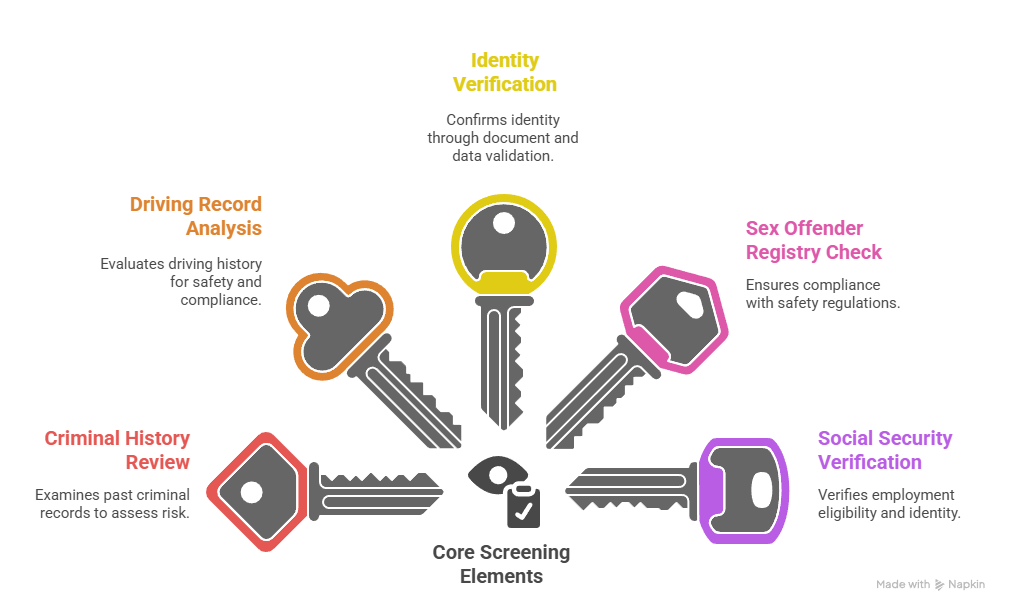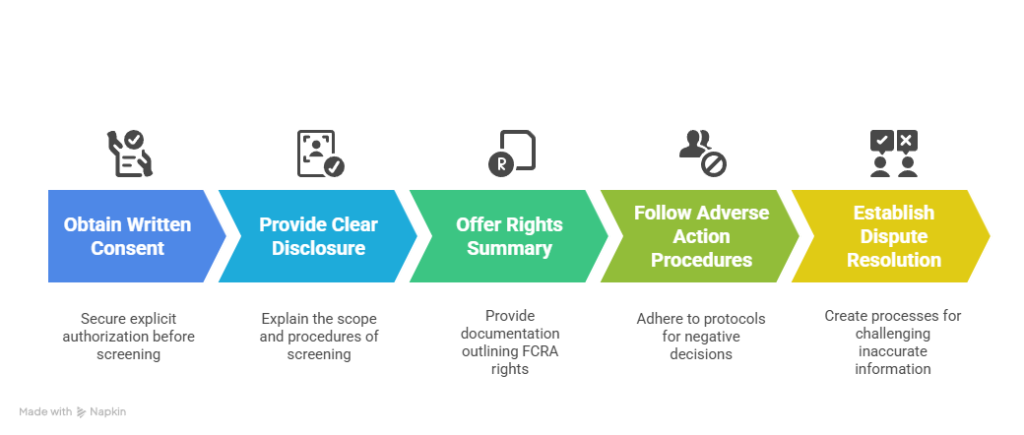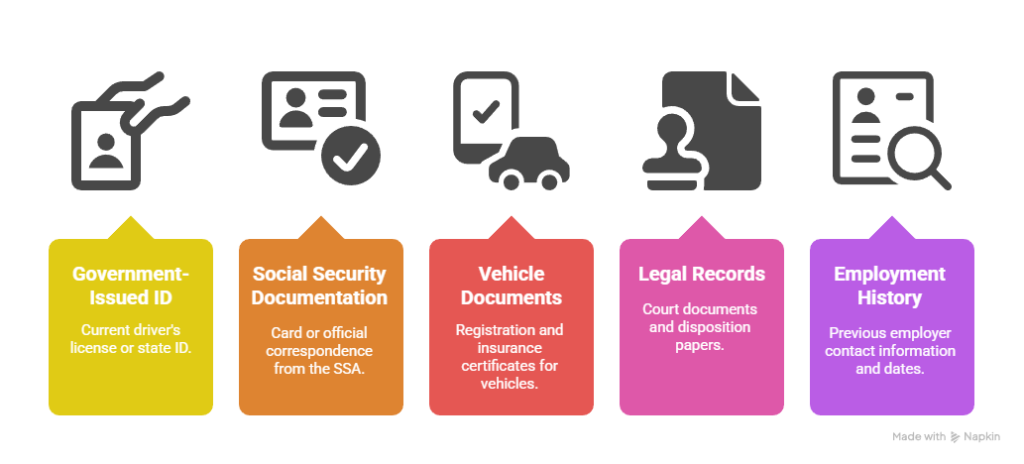Utah's Senate Bill 148 mandates comprehensive annual background checks for all gig economy drivers, requiring criminal history reviews, driving record evaluations, and continuous monitoring throughout employment. These regulations ensure public safety while creating ongoing compliance obligations for both platforms and workers under strict Fair Credit Reporting Act guidelines.
Key Takeaways
- Utah's SB 148 requires gig economy drivers to undergo annual background checks to ensure safety and legal compliance
- These checks evaluate criminal records, driving history, and identity verification, which protect passengers and uphold public trust
- Compliance with the Fair Credit Reporting Act is essential, requiring platforms to obtain consent and provide reports to gig workers if their background checks result in adverse decisions
- Drivers should maintain accurate personal records, resolving any discrepancies proactively to prevent issues during screenings or re-screenings
- Preparing for these checks means gathering necessary documents and addressing potential concerns like traffic violations before they affect employability
Navigating Utah's gig economy requires understanding specific background check regulations that protect both drivers and passengers. With Senate Bill 148 (SB 148) establishing comprehensive screening requirements, gig workers must comply with annual background checks and continuous monitoring systems. This legislation fundamentally changed how rideshare companies, delivery platforms, and other gig economy businesses approach driver vetting in Utah.
The Utah gig economy background check process serves multiple purposes beyond regulatory compliance. These screenings protect public safety, maintain platform credibility, and ensure qualified drivers represent gig companies. Understanding SB 148's requirements helps both employers and workers navigate the complex landscape of background screening, annual re-evaluations, and Fair Credit Reporting Act (FCRA) compliance.
What is Utah's SB 148 and Its Impact on Gig Workers
Utah's Senate Bill 148 represents landmark legislation specifically targeting transportation network companies and gig economy platforms. Enacted to address growing safety concerns in the rideshare industry, this bill established mandatory background check protocols for all gig economy drivers operating within Utah's borders. The legislation requires comprehensive criminal history reviews, driving record evaluations, and identity verification processes before drivers can begin working.
SB 148 mandates annual re-screening for all active gig economy drivers, creating an ongoing compliance requirement rather than a one-time hurdle. This continuous monitoring approach ensures that drivers maintain acceptable standards throughout their employment tenure. The bill also establishes specific timelines for background check completion, typically requiring checks to be completed within 30 days of application submission.
| SB 148 Requirement | Timeline | Compliance Impact |
| Initial Background Check | Within 30 days of application | Mandatory before work begins |
| Annual Re-screening | Every 12 months | Ongoing employment requirement |
| Continuous Monitoring | Real-time alerts | Immediate action required for violations |
| FCRA Compliance | Throughout process | Legal protection for workers |
The legislation significantly impacts gig economy operations by requiring platforms to implement robust screening infrastructures. Companies must now maintain detailed records of all background checks, establish protocols for handling adverse findings, and ensure compliance with both state and federal regulations. This comprehensive approach has elevated Utah's gig economy safety standards while creating additional operational complexities for platform operators.
Understanding Utah Gig Economy Background Check Requirements
The Utah gig economy background check encompasses multiple verification layers designed to assess driver suitability comprehensively. These screenings examine criminal history, driving records, and identity verification to ensure public safety and regulatory compliance. The process involves accessing multiple databases and cross-referencing information from various jurisdictions to create a complete picture of each applicant's background.
Initial Screening Components
Criminal background checks examine local, state, and federal databases for convictions, pending charges, and criminal history patterns. These searches typically cover seven years of criminal activity, though certain serious offenses may extend beyond this timeframe. The screening process also evaluates the nature and severity of offenses, considering their relevance to gig economy work responsibilities.
Driving record evaluations analyze motor vehicle records from Utah's Department of Motor Vehicles and other jurisdictions where applicants held licenses. This component examines traffic violations, license suspensions, accidents, and overall driving performance metrics. Identity verification confirms that applicants are who they claim to be through document authentication and cross-referencing multiple identification sources.

Core Screening Elements:
- Criminal History Review: This comprehensive examination searches through federal, state, and local databases to identify any felony convictions, misdemeanor charges, pending criminal cases, and patterns of criminal behavior that might pose safety risks to passengers or the general public.
- Driving Record Analysis: This detailed evaluation reviews an applicant's complete driving history including traffic violations, moving violations, license suspensions or revocations, at-fault accidents, and overall driving performance metrics from all jurisdictions where the individual has held driving privileges.
- Identity Verification: This multi-step authentication process validates the applicant's true identity through cross-referencing government-issued identification documents, social security records, and personal information across multiple databases to prevent identity fraud and ensure accurate background screening results.
- Sex Offender Registry Check: This mandatory safety screening searches both national and state-level sex offender registries to identify individuals who may pose risks to public safety, particularly important for positions involving direct contact with customers and access to private residences.
- Social Security Verification: This employment eligibility confirmation validates the applicant's social security number, work authorization status, and legal right to employment in the United States while also serving as an additional layer of identity verification and fraud prevention.
The screening process also includes verification of work authorization and eligibility to operate commercial vehicles in Utah. Platform operators must ensure all drivers meet federal and state requirements for commercial driving activities, including appropriate licensing and insurance coverage.
Annual Re-Screening Process
Annual re-screening under SB 148 requires gig economy platforms to conduct comprehensive background checks on all active drivers every twelve months. This process mirrors initial screening requirements but focuses on identifying changes in criminal history, driving records, or legal status that occurred since the previous evaluation. The re-screening timeline typically begins on the anniversary of the driver's initial approval or platform onboarding date.
Continuous monitoring systems supplement annual re-screening by providing real-time alerts when significant changes occur in driver records. These systems automatically flag new criminal charges, traffic violations, or license suspensions as they appear in relevant databases. Platform operators must respond to these alerts within specified timeframes, often requiring immediate driver suspension pending investigation.
| Screening Type | Frequency | Scope | Response Time |
| Initial Screening | Once before employment | Complete background review | 3-5 business days |
| Annual Re-screening | Every 12 months | Updated records check | 3-5 business days |
| Continuous Monitoring | Real-time | Ongoing database queries | Immediate alerts |
The re-screening process includes updated criminal background checks, current driving record evaluations, and identity verification confirmations. Drivers must provide updated documentation if requested and may face temporary suspension during the re-screening period.
Legal Framework and Compliance Requirements
Federal and state regulations create a complex legal framework governing Utah gig economy background checks. The Fair Credit Reporting Act provides foundational consumer protections, while Utah's specific legislation adds additional requirements and restrictions. Understanding these overlapping requirements is essential for both platforms and workers to ensure full compliance and avoid legal complications.
FCRA Compliance for Gig Economy Platforms
Fair Credit Reporting Act compliance forms the foundation of legal background screening in Utah's gig economy. FCRA regulations require platforms to obtain written consent before conducting background checks, provide clear disclosure of screening activities, and follow specific procedures when adverse employment decisions occur. These federal requirements apply to all gig economy background checks conducted in Utah, regardless of state-specific legislation.
Pre-screening disclosure requirements mandate that platforms inform applicants about background check procedures in clear, understandable language. This disclosure must occur before obtaining consent and should explain the scope of screening activities, types of information collected, and potential consequences of adverse findings. Platforms must also provide applicants with copies of their rights under FCRA, typically through standardized summary documents.

FCRA Compliance Checklist:
- Written Consent: Platforms must obtain explicit written authorization from applicants before initiating any background screening activities, ensuring that consent is voluntary, informed, and documented according to federal compliance standards.
- Clear Disclosure: Companies are required to provide comprehensive explanations of their background screening scope, procedures, and criteria in plain language that applicants can easily understand before requesting their consent to proceed.
- Rights Summary: Employers must furnish applicants with standardized FCRA rights documentation that clearly explains their legal protections, dispute rights, and remedies available under federal consumer protection laws.
- Adverse Action Procedures: Platforms must follow specific legal protocols when background checks result in negative employment decisions, including pre-adverse action notices and final adverse action communications with required waiting periods.
- Dispute Resolution: Companies are obligated to establish and maintain accessible processes for applicants to challenge inaccurate background check information and to investigate such disputes in accordance with FCRA timelines and requirements.
When background checks reveal disqualifying information, platforms must follow FCRA's adverse action procedures. This process includes providing pre-adverse action notices, allowing time for applicant response, and issuing final adverse action letters with specific rights information.
State-Specific Regulations and Restrictions
Utah law imposes additional restrictions on background screening beyond federal FCRA requirements. The state limits consideration of certain criminal offenses, particularly those unrelated to driving or public safety responsibilities. Juvenile records generally cannot be considered in employment decisions, and certain misdemeanor convictions may have time limitations for consideration.
Credit information access is restricted under Utah law for gig economy positions, as these roles typically don't involve financial responsibilities that would justify credit checks. Platforms must demonstrate legitimate business reasons for accessing credit information and must comply with additional disclosure requirements when credit reports are used in employment decisions. Utah's ban-the-box legislation affects how platforms can inquire about criminal history during initial application processes.
Preparing for Background Checks as a Gig Worker

Successful background check preparation requires proactive planning and comprehensive documentation management. Gig workers who understand the screening process and prepare accordingly experience fewer delays and complications during the application process. This preparation also demonstrates professionalism and attention to detail that employers value in potential drivers.
Documentation and Record Management
Comprehensive personal record management begins with organizing all relevant identification documents, including driver's licenses, social security cards, and passport information. Workers should maintain current copies of vehicle registration, insurance certificates, and any professional licenses or certifications. Having these documents readily available in both physical and digital formats accelerates the screening process.
Criminal record awareness is crucial for workers who may have past legal issues. Obtaining certified copies of court records, disposition documents, and expungement papers helps workers understand exactly what background checks will reveal. This knowledge allows for proactive communication with employers about potential issues and demonstrates transparency in the application process.

Essential Documentation Checklist:
- Government-Issued ID: Workers must maintain current, unexpired driver's licenses or state identification cards that clearly display their legal name, photograph, and current address to serve as primary identification during the background screening process.
- Social Security Documentation: Applicants should have their original Social Security card or official correspondence from the Social Security Administration readily available to verify their social security number and confirm their legal identity for employment eligibility purposes.
- Vehicle Documents: Drivers must possess current vehicle registration certificates and valid insurance policies that meet state minimum coverage requirements, demonstrating their legal authority to operate their vehicles commercially within Utah's jurisdiction.
- Legal Records: Individuals with criminal history should obtain certified copies of all court documents, disposition papers, plea agreements, and expungement records to provide complete and accurate information about their legal background and case resolutions.
- Employment History: Workers should compile comprehensive contact information for previous employers, including company names, addresses, phone numbers, supervisor names, and employment dates to facilitate thorough employment verification during background screening processes.
Workers should regularly monitor their own background information through annual credit reports and driving record reviews. Many states provide online access to driving records, and workers can request copies of their criminal history from relevant law enforcement agencies.
Addressing Common Disqualifying Factors
Traffic violations represent the most common disqualifying factors in Utah gig economy background checks. Minor infractions like speeding tickets may not automatically disqualify candidates, but patterns of violations or serious offenses like DUI convictions typically result in rejection. Workers should address outstanding tickets promptly and consider defensive driving courses to improve their driving records.
Criminal history issues require careful consideration and potential legal consultation. While many minor offenses may not disqualify candidates, violent crimes, theft-related charges, or drug offenses often result in automatic rejection. Workers with criminal history should understand their rights under FCRA and state law, including opportunities to provide context or demonstrate rehabilitation.
Employment gaps or inconsistent work history can raise concerns during background screening. Workers should prepare explanations for gaps and maintain documentation of any relevant activities during non-employment periods. Volunteer work, education, or personal circumstances that explain employment gaps can help provide context to potential employers.
Employer Obligations and Best Practices
Gig economy platforms face complex obligations when implementing background screening programs in Utah. These responsibilities extend beyond simple compliance to include ethical considerations, operational efficiency, and risk management. Successful platforms develop comprehensive screening programs that balance safety requirements with fair treatment of applicants.
Implementing Compliant Screening Programs
Comprehensive screening programs require written policies defining screening procedures, disqualifying factors, and appeal processes. These policies should clearly outline the types of background checks conducted, the criteria used for making employment decisions, and the procedures for handling adverse findings. Clear documentation helps ensure consistent application of screening standards and provides legal protection against discrimination claims.
Vendor selection for background screening services requires careful evaluation of compliance capabilities and service quality. Platforms should choose providers with demonstrated FCRA expertise, comprehensive database access, and robust quality control procedures. The selected vendor should also provide ongoing support for dispute resolution and compliance monitoring.
Screening Program Components:
- Written Policies: Clear procedures and standards documentation
- Vendor Management: Qualified provider selection and oversight
- Staff Training: Proper procedure implementation and compliance
- Record Keeping: Comprehensive documentation and audit trails
- Quality Control: Regular program evaluation and improvement
Training programs for staff involved in background screening ensure proper procedure implementation and compliance maintenance. All personnel handling background check information should understand FCRA requirements, state law restrictions, and company policies.
Managing Adverse Action Procedures
When background checks reveal disqualifying information, platforms must follow precise adverse action procedures to maintain FCRA compliance. The pre-adverse action process requires providing applicants with copies of their background reports and FCRA rights summaries before making final decisions. This step allows applicants to review information and dispute any inaccuracies.
The dispute resolution process should provide clear channels for applicants to challenge background check information or provide additional context. Platforms should establish timelines for reviewing disputes and maintain documentation of all communications. Some platforms also allow applicants to provide explanations or evidence of rehabilitation for criminal history issues.
Final adverse action letters must include specific information about the decision basis, applicant rights, and dispute procedures. These letters should clearly identify the background check provider and explain how applicants can obtain free copies of their reports. Proper adverse action procedures protect both platforms and applicants while ensuring legal compliance.
Navigating Multi-Platform Employment
Modern gig workers often pursue opportunities across multiple platforms to maximize earning potential and maintain income stability. However, this multi-platform approach introduces complexity in background screening requirements and compliance obligations. Understanding how background checks interact across different platforms helps workers plan their application strategies effectively.
Cross-Platform Background Check Implications
Each gig economy platform typically requires separate background checks, even when screening requirements appear similar. While the core components of criminal history, driving records, and identity verification remain consistent, platforms may use different screening providers or apply varying standards for evaluation. Workers should prepare for multiple screening processes and understand that approval by one platform doesn't guarantee acceptance by others.
Background check timing can significantly affect multi-platform employment strategies. Some platforms may accept recent background checks from other providers within specific timeframes, while others require fresh screenings regardless of previous results. Workers should research platform-specific policies and plan application timing to minimize redundant screening costs and delays.
Information sharing between platforms is generally prohibited under FCRA and privacy laws. Each platform must obtain independent consent for background checks and cannot share screening results with competitors. This protection ensures that workers maintain control over their personal information and prevents industry-wide blacklisting based on single platform decisions.
Industry-Specific Considerations
Different gig economy sectors may have varying background check requirements based on their specific risk profiles and regulatory environments. Food delivery services might focus heavily on criminal history due to customer interaction concerns, while package delivery platforms may emphasize driving record quality. Understanding these sector-specific priorities helps workers target appropriate opportunities and prepare accordingly.
Transportation network companies face the most stringent requirements under SB 148, with comprehensive screening and annual re-screening mandates. Task-based service platforms may have more flexible requirements depending on the nature of work performed. Workers should research specific requirements for their target sectors and understand how their background might be evaluated differently across industries.
Technology and Continuous Monitoring Systems
Advanced technology systems have revolutionized background screening in Utah's gig economy, enabling real-time monitoring and automated compliance tracking. These systems provide platforms with immediate alerts about changes in driver records while offering workers transparency in the screening process. Understanding how these technologies work helps both parties navigate the modern background screening landscape effectively.
Continuous monitoring systems access multiple databases including criminal records, driving records, and sex offender registries on an ongoing basis. The frequency of these searches varies by provider and platform requirements, but many systems conduct daily or weekly database queries. This approach ensures that platforms maintain current information about driver qualifications without waiting for annual re-screening cycles.
Monitoring System Capabilities:
- Real-Time Alerts: Immediate notification of record changes
- Database Integration: Access to multiple information sources
- Automated Reporting: Streamlined compliance documentation
- Privacy Protection: Secure data handling and access controls
- Audit Trails: Complete record of screening activities
Privacy considerations for continuous monitoring require careful balance between safety needs and worker privacy rights. Workers must provide consent for ongoing monitoring, and platforms must clearly explain the scope and frequency of these searches. Some jurisdictions may impose additional restrictions on continuous monitoring practices, requiring platforms to demonstrate ongoing business necessity for such surveillance.
Conclusion
Utah's SB 148 has fundamentally transformed the gig economy landscape by establishing comprehensive background check requirements that prioritize public safety while protecting worker rights through FCRA compliance. Both drivers and platforms must navigate annual re-screening processes, continuous monitoring systems, and complex legal frameworks to maintain successful operations in this evolving regulatory environment. By understanding these requirements and implementing proactive compliance strategies, stakeholders can build a safer, more trustworthy gig economy that benefits drivers, platforms, and the communities they serve throughout Utah.
Frequently Asked Questions
What types of background checks are required for gig economy drivers in Utah?
In Utah, gig economy drivers must undergo comprehensive background checks that include criminal history reviews, driving record evaluations, and identity verification. These checks examine both in-state and out-of-state records to ensure complete coverage of an applicant's background. The screening process also includes searches of sex offender registries and verification of work authorization status.
How often do drivers need to undergo background checks in the Utah gig economy?
Utah's SB 148 requires an initial background check before drivers can begin work, followed by annual re-screening thereafter. Additionally, continuous monitoring systems track driver records in real-time, alerting platforms immediately when new issues arise. This multi-layered approach ensures ongoing compliance with safety standards throughout a driver's tenure.
How long does a background check take in Utah for gig economy employment?
Background checks for Utah gig economy positions typically take 3-5 business days to complete, though complex cases may require additional time. The timeframe depends on factors such as the applicant's residential history, the number of jurisdictions requiring searches, and the responsiveness of various databases. Rush processing may be available for an additional fee.
What happens if a driver fails a background check in Utah?
If a driver fails a background check, they may be disqualified from working with that specific platform. However, drivers have the right to dispute inaccurate information and can request copies of their background reports. The platform must follow FCRA adverse action procedures, providing proper notice and opportunity for dispute before making final decisions.
Can a background check affect employment with multiple gig platforms?
Yes, background check results can impact employment opportunities across multiple platforms, though each company conducts independent screenings. Platforms cannot share background check results with competitors, but similar screening standards may produce consistent outcomes. Workers should address any background issues proactively to minimize impact across potential employers.
Are there restrictions on what can be checked in Utah gig economy background screens?
Utah law restricts consideration of certain information, including juvenile records and some older criminal convictions. Credit information access is also limited for gig economy positions unless directly related to job functions. Platforms must demonstrate legitimate business reasons for accessing specific types of information and comply with disclosure requirements.
How can drivers dispute errors on background checks in Utah?
Drivers can dispute background check errors by contacting the screening company directly and providing supporting documentation. The dispute process typically involves submitting written requests with evidence of inaccuracies, such as court documents or corrected records. Screening companies must investigate disputes within 30 days and correct any verified errors.
Do Utah employers have to inform drivers about background checks?
Yes, federal FCRA law requires employers to provide written notice and obtain consent before conducting background checks. Employers must also provide applicants with copies of their rights under FCRA and follow specific procedures when adverse employment decisions are made based on background check results.
Can background checks affect credit scores in Utah?
No, employment background checks do not affect credit scores. These checks are considered "soft inquiries" that don't impact credit ratings. However, if employers access credit reports as part of background screening, they must comply with additional disclosure requirements and demonstrate legitimate business necessity.
What resources are available for understanding Utah gig economy background check requirements?
Workers and employers can access information through Utah's Department of Commerce, the Federal Trade Commission's FCRA guidance, and industry-specific resources. Legal consultation may be beneficial for complex situations, and many background screening companies provide educational materials about compliance requirements and best practices.
Additional Resources
- Utah State Legislature - Senate Bill 148 Full Text
https://le.utah.gov/~2024/bills/static/SB0148.html - Federal Trade Commission - Fair Credit Reporting Act Guidance
https://www.ftc.gov/legal-library/browse/rules/fair-credit-reporting-act - Utah Department of Commerce - Transportation Network Companies
https://commerce.utah.gov/psc/transportation-network-companies/ - Utah Department of Public Safety - Criminal Background Check Services
https://bci.utah.gov/criminal-background-checks/ - Consumer Financial Protection Bureau - Background Check Rights
https://www.consumerfinance.gov/about-us/blog/know-your-rights-when-background-check-company-has-wrong-info/ - Utah Department of Motor Vehicles - Driving Record Requests
https://dmv.utah.gov/records/driving-record - Society for Human Resource Management - Background Check Compliance
https://www.shrm.org/topics-tools/tools/toolkits/background-check-toolkit

GCheck Editorial Team
Meet the GCheck Editorial Team, your trusted source for insightful and up-to-date information in the world of employment background checks. Committed to delivering the latest trends, best practices, and industry insights, our team is dedicated to keeping you informed.
With a passion for ensuring accuracy, compliance, and efficiency in background screening, we are your go-to experts in the field. Stay tuned for our comprehensive articles, guides, and analysis, designed to empower businesses and individuals with the knowledge they need to make informed decisions.
At GCheck, we're here to guide you through the complexities of background checks, every step of the way.





